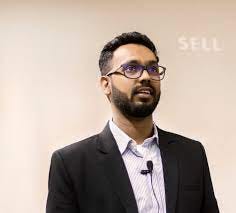For our Seventh session of ‘rapid fire questions’, we’ll be speaking with Kumar Ranjan, founder of E-feed (Animal nutrition-centric platform empowering farmers with quality feed and data, bringing traceability in animal nutrition value chain)
What’s the state of climate-tech in India, according to you?
Kumar:
Climate tech is definitely talk of the town but given the rate of industrialization and urbanization it's mostly limited to theoretical discussions between government, bureaucrats, startups and investors.
Truth is India needs more employment. Unfortunately our economic condition pushes into rapid expansion of manufacturing units, processing plants, transportation and livestock. All this is a heavy tax on the climate.
Look at New Zealand where in order to curb methane emissions from livestock they banned many farmers which resulted in unemployment for many.
Though the business model of carbon offset is getting popular in developing nations like India, most of it is non-traceable and inefficient. Planting more trees and still generating emissions is like hitting someone again and again but saying sorry every time.
How does sustainability drive your business?
Kumar:
We are working in the livestock sector where improving the quality of input nutrition (feed) can reduce methane emissions.
Better the quality of nutrition, better is the digestion and lesser methane emissions.
We are working towards making this nutrition affordable and available for all the farmers of the country to drive impact at scale.
What core principles do you tend to follow while practicing sustainability in day-to-day operations?
Kumar:
It starts with people caring about the cause. We are trying to educate everyone who consumes dairy and meat to be aware of sustainability of their food.
If the urban consumers ask for sustainable meat and dairy it will automatically generate demand in the farmers for using quality nutrition in their feeds.
What pain points does the business face as the economy heads into a recession?
Kumar:
Let's say everything is becoming expensive. Recently milk price was increased by 2 ₹ for urban consumers. Out of this 2₹ only a fraction reaches the farmers, rest gets consumed in the supply chain as fuel and power prices also increase. This results in decreased purchasing power of the farmers.
For us to maintain a certain quality of our nutrition products we can't go below a certain critical price. (Unless we were a government owned cooperative) that's the biggest bottle neck to solve.
A venture in your sector and outside your sector you admire and why?
Kumar
That's kinda tough to answer as none of the companies is trying to solve this problem in India. That's the reason I quit my automotive career of 7 years and entered this industry to take it head-on.
Now that we’ve heard from our portfolio founders, We’ll wrap it up with thoughts from the Huddle team on ClimateTech as a segment.
Ishaan Khosla: Climate change is no longer a distant theory but an actual reality. Take the fires in Madhya Pradesh in April, the floods in Bangalore in September, or the deficient rainfall in Jharkhand – disruptive weather events of this nature make the climate crisis more personal. Given the urgency, Climate-Tech today is driven by founders willing to innovate, disrupt, and solve deep-rooted problems affecting critical mass, a feat which is driven by macro and micro-factors that promise a different outcome from its predecessor, Clean-Tech in the late 2000s.
That's all for today! We’d like to appreciate our portfolio founder Kumar for taking out time from his extremely busy schedule to add valuable insights to our subscribers.

That's all for today! This space is for founders in the sectors and solutions we are bullish about, therefore, a call out if you are a founder building in the Climate Tech space, you can reach us at connect@huddle.work and we look forward to brainstorming with you. If you are an enabler and investor and would like a further look into our ecosystem, then we are happy to dive deep into these sectors alongside you.
These are popular questions that have been asked by our subscribers and have emerged across each of the themes covered. (Keep your questions coming our way and we’ll continue our best to decode for you!)










